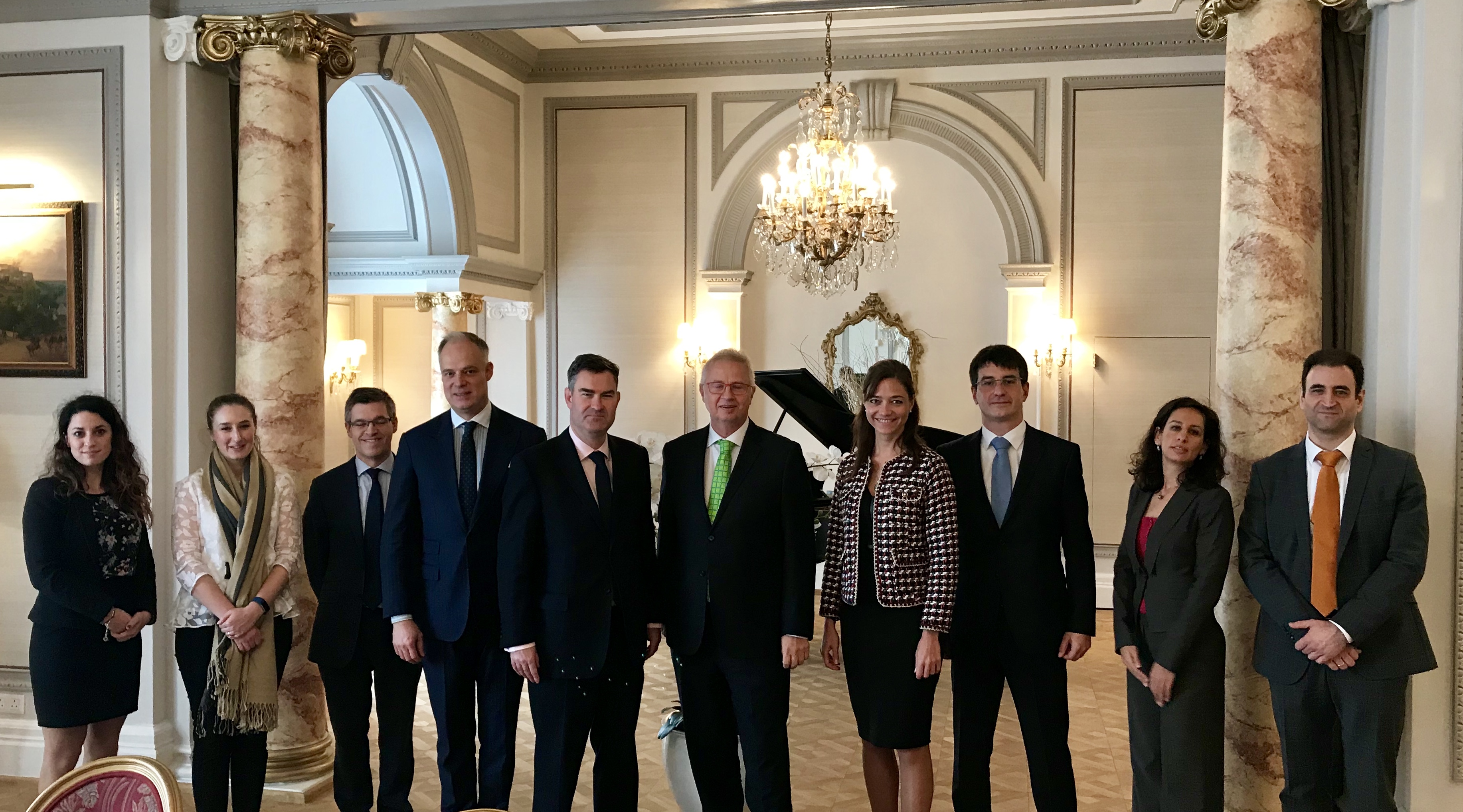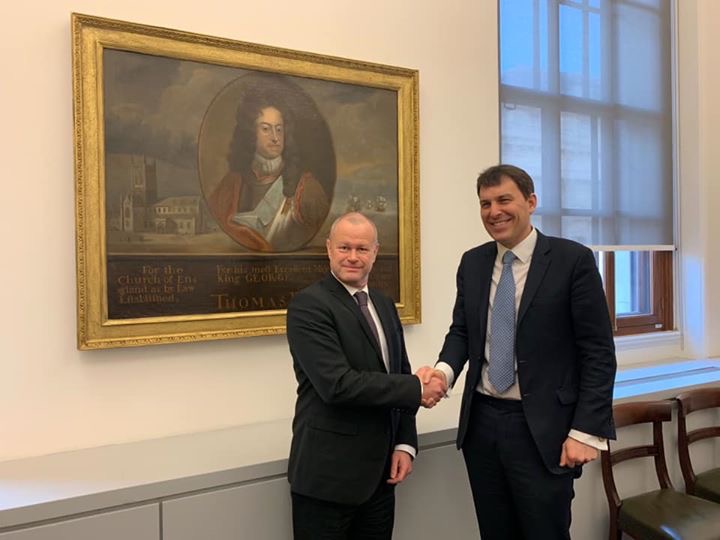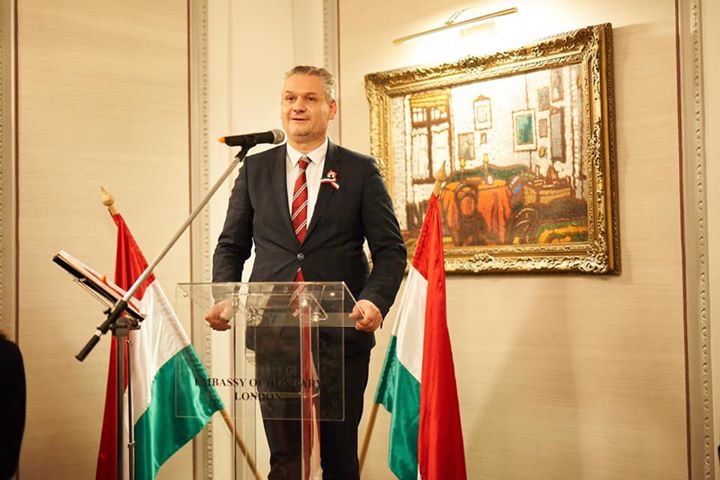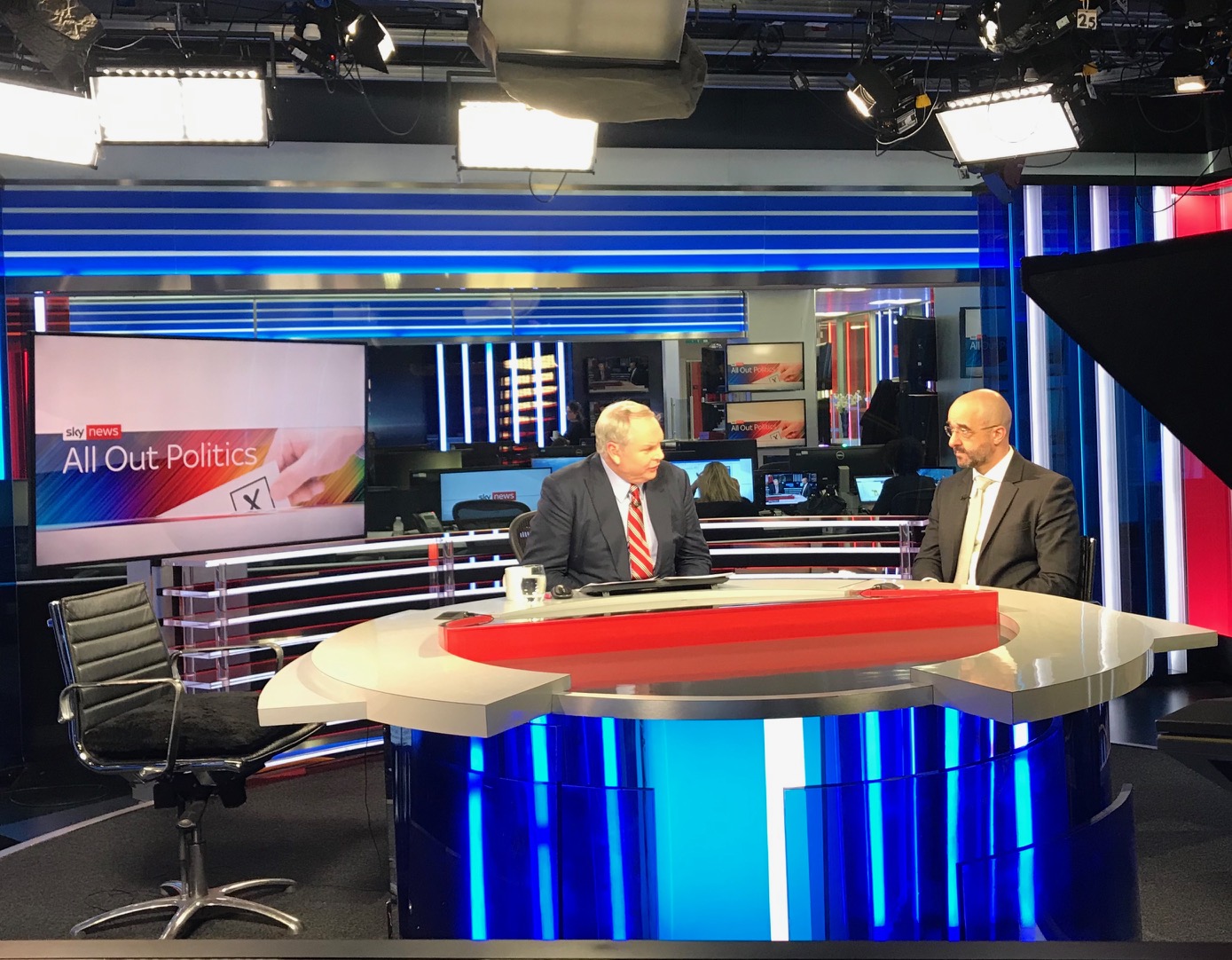Keresés: Xi
Keresés: Xi
Deputy Minister’s visit in London
Deputy Minister Balázs Orbán and Deputy State Secretary Ernő Schaller-Baross had a two-day-visit in London, where they had talks with high-profile politicians, Christian leaders, journalists and think tankers.
Deputy Minister Balázs Orbán and Under Secretary of State Ernő Schaller-Baross visited London on 12th and 13th November 2018, where they met high-ranking government officials, Members of Parliament and prominent think tank leaders to discuss the excellent relations between the United Kingdom and Hungary, the current state of the Brexit negotiations, the on-going political changes in Europe, the importance of aiding persecuted Christian and the successes of the Hungary Helps programme.
The visit of Justice Minister László Trócsányi
Smooth legal cooperation between the UK and Hungary is very important, regardless of the direction that the process of the cessation of Britain’s EU membership (Brexit) might take, Justice Minister László Trócsányi said in London.
On 29 November 2018 the Justice Minister had talks with his British counterpart David Gauke about their views on current challenges in the justice system and post-Brexit cooperation in criminal and civil judicial matters at the Embassy of Hungary upon the invitation of Ambassador Kristóf Szalay-Bobrovniczky.
Furthermore he met Baroness Natalie Evans, Leader of the House of Lords, member of the British Cabinet, Bob Neill MP, Chair of the Justice Committee of the House of Commons and Chair of the All-Party Parliamentary Hungary Group and Sir William Cash MP, chair of the European Scrutiny Committee.
After his talks, Mr Trócsányi told the Hungarian news agency MTI that cooperation between the two countries currently equally extends to the areas of civil law, family law, trade law and penal law. Thanks to the large Hungarian community living in Britain and the intensive commercial and judicial relations, the two countries are connected together by “a thousand ties”, he added.
Ministerial talks in Chevening
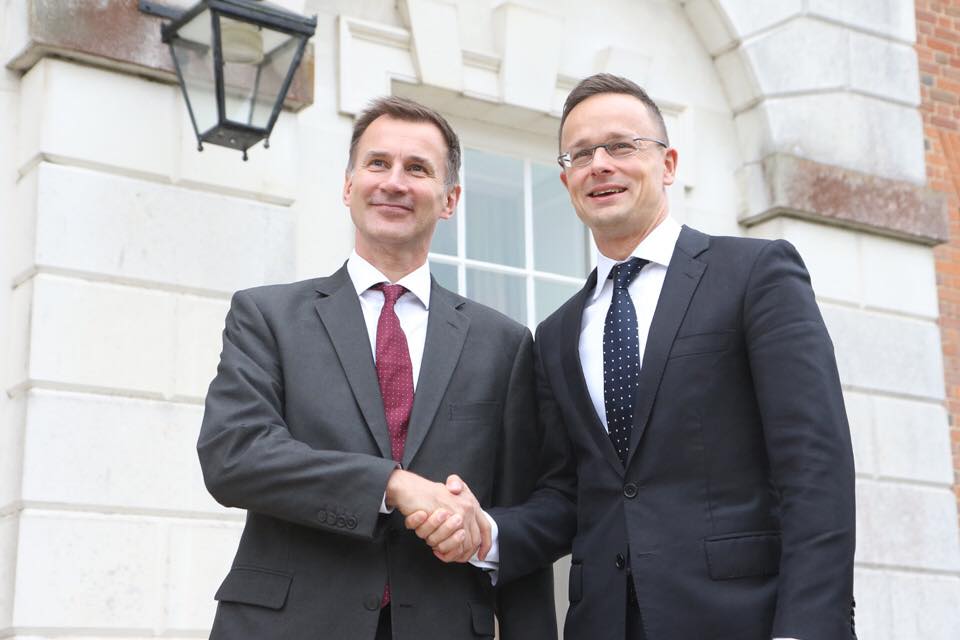
The Minister for Foreign Affairs and Trade Péter Szijjártó arrived in Chevening upon the invitation of Foreign Secretary Jeremy Hunt to participate at talks about current challenges in security policy.
The Minister took part in an informal meeting of foreign ministers of the countries of the Visegrád Group (V4), Slovenia, Bulgaria, Croatia and Romania, at the invitation of his British counterpart Jeremy Hunt at the Foreign Secretary’s country residence in Chevening, Southeast England. The discussions with his counterparts focused on current challenges in security policy.
At the site of the meeting, Mr. Szijjártó told the Hungarian news agency MTI: “The region expects the EU to achieve a Brexit agreement that can be acknowledged as fair by both parties”. “The lack of such agreement would grossly violate the interests of Central Europe in view of the fact that the region realises an extremely high level of trade turnover with the United Kingdom and there is a major level of British investment in the region’s economies. In addition, millions of people from the countries of Central Europe live and work in the United Kingdom and their rights must also be guaranteed”, he added.
Photo credit: FCO
Secretary of State Gábor Gion had talks in London
The Secretary of State for Financial Policy at the Ministry of Finance conducted meetings in the UK with John Glen MP, Economic Secretary to the Treasury and with other important representatives of British economic life.
Mr Gábor Gion, Secretary of State for Financial Policy at the Ministry of Finance paid an official visit to London to hold bilateral discussions with John Glen MP, Economic Secretary to the Treasury. Mr Gion also had exciting conversations in relation to the Brexit process and the future of the sector with representatives of the financial services industry at the City of London Corporation, as well as with UK Finance and with The CityUK. Furthermore the Secretary of State attended a working lunch with high level representatives of British and international banks and meetings with credit rating agencies.
Brexit és EU állampolgárok jogaival kapcsolatos fórum

A londoni magyar nagykövetség, a manchesteri főkonzulátus és az edinburghi alkonzulátus Takács Szabolcs európai uniós ügyekért felelős államtitkár és egy, az Európai Bizottság által szerződtetett független brit jogi szakértő részvételével fórumokat hirdet az Egyesült Királyságban élő magyar állampolgárok számára.
Az események a résztvevőknek lehetőséget biztosítanak arra, hogy a kilépési folyamattal kapcsolatosan tájékozódjanak.
MIKOR? HOL?
London: 2019. március 14., csütörtök 18:00 – 19:00, Magyar Nagykövetség (35 Eaton Place, London, SW1X 8BY)
Edinburgh: 2019. március 15., péntek 17:00 – 18:00, Magna Hungaria (29 West Maitland Street, Edinburgh, EH12 5DX)
Manchester: 2019. március 16., szombat 12:00 – 13:00, Central Library (St Peter’s Square, Manchester, M2 5PD)
Chester: 2019. március 16., szombat 18:00 - 19:00, Storyhouse Chester ( Hunter St., Chester, CH1 2AR)
REGISZTRÁCIÓ:
A részvétel ingyenes, de a regisztráció kötelező, mely megtehető az alábbi linkeken:
MÉDIA:
A londoni esemény a londoni magyar nagykövetség Facebook oldalán (@HunEmbassy.LON) élő videó szolgáltatáson keresztül követhető lesz.
TOVÁBBI HASZNOS INFORMÁCIÓ:
Minister of State Szabolcs Takács held information session on Brexit and EU citizen’s rights
Minister of State for EU Policies Szabolcs Takács made a multi-day visit to the United Kingdom meeting the Hungarian community to discuss the situation after Brexit.
The Minister of State held an information session first in London, then in Edinburgh, Manchester and Chester in the next two days, with the contribution of a British legal expert commissioned by the European Commission to inform the Hungarian citizens about the consequences of UK’s departure from the European Union. Szabolcs Takács underlined that the protection of the acquired rights of Hungarians living in the UK is a priority for the Hungarian government, and, although Hungary is interested in a Brexit with a deal, the intentions of the British government guaranteeing these rights even in the case of a no-deal Brexit are also welcomed.
Mr Takács participated as guest of honour in the national day receptions in London, Manchester and Chester to commemorate the 1848/1849 Hungarian Revolution and Freedom Fight, moreover he also had talks with prominent British politicians, analysts and heads of research institutions. Among others he met in London Minister of State for Europe and the Americas Rt Hon Sir Alan Duncan to exchange views on bilateral relations and Minister of State at DExEU Lord Callanan to talk about Brexit negotiations and the Future of Europe. In the Westminster Parliament Minister of State Takács also had talks with Bob Neill MP, the chair of the Hungarian APPG and he discussed the topics of Brexit negotiation, EP election and migration with Lord Hill, former EU Commissioner and Charles Grant, the director of Centre for European Reform.
In Edinburgh, Szabolcs Takács met Ben MacPherson, Minister for Europe and Migration of the Scottish Government and Gillian McGregor, director of the UK Government Office for Scotland.
Minister of State Takács participated at a debate at University College London about the possibilities to reform the EU and met Hungarian nationals living in the UK to brief them on Brexit and their rights as EU citizens. He also gave an interview to Sky News All Out Politics on College Green, and he laid a wreath on Lajos Kossuth’s plaque in Manchester.
The Minister of State for Government Communications and Public Relations in London
Zoltán Kovács, Minister of State for Government Communications and Public Relations and Government Commissioner for the World Expo of Hunting 2021 visited London to promote the event among the leaders of the British Association for Shooting and Conservation, Countryside Alliance; the All Party Parliamentary Group on Shooting and Conservation; the Game & Wildlife Conservation Trust and the British Shooting Show.
The Minister of State also gave an interview to Sky News All Out Politics about the Hungarian government’s policies on migration and the EP election, including the Hungary Helps programme, a Hungarian government initiative, which delivers aid to persecuted Christians worldwide. Zoltán Kovács held a press conference as well briefing about Hungary’s stance on the Brexit negotiations, the EP election and recent political and economic developments in Hungary.
Az Európai Unió területén kívül lakóhellyel rendelkezem
2018. december 28-án lépett hatályba az a magyar Parlament által december 20-án elfogadott jogszabály, amely módosítja az Európai Parlament tagjainak választásáról szóló 2003. évi CXIII. törvény egyes rendelkezéseit, ezzel lehetővé téve, hogy – a korábbi, szűkebb körű lehetőségekhez képest – az Európai Parlament tagjainak választásán az a magyar állampolgár is választó legyen, aki az Európai Unió területén kívüli lakóhellyel rendelkezik.
Az érintettek csak abban az esetben szerepelhetnek a levélben szavazók névjegyzékben, ha a szavazást megelőző 25. napig (2019. május 2. napjáig) regisztrációs kérelmet nyújtanak be (a korábban minden külképviseletre kiküldött 62-es/63-as formanyomtatványon vagy a valasztas.hu/ oldalon) és a központi névjegyzékbe való felvételüket kérik.
Amennyiben a magyar állampolgár korábban, az előző választások alkalmával már regisztrált és a magyar lakcímnyilvántartás adatai szerint Európai Unió területén kívüli lakóhellyel rendelkezik, akkor nincs teendője, automatikusan felkerül a levélben szavazók névjegyzékére, a korábbi kérelmében megadott adatokkal.
Amennyiben a magyar állampolgár lakóhelyre vonatkozó adatai nem szerepelnek a magyar lakcímnyilvántartásban (pl. nincs lakcímkártyája és érvényes magyar útlevéllel regisztrál), akkor ahhoz, hogy igazolható legyen, hogy Európai Unión kívüli lakóhellyel rendelkezik, külföldi lakóhelyének a címét is meg kell adnia.
Ha a magyar állampolgár rendelkezik Ügyfélkapu regisztrációval, külföldi lakóhelyét bejelentheti elektronikusan is a nyilvantarto.hu/ugyseged/ oldalon keresztül. Amennyiben a választópolgár az EP választáson a korábban benyújtott regisztrációs kérelmében megadottól eltérő helyre kéri a szavazási levélcsomag postázását, ezt a regisztrációs nyomtatvány megfelelő rovatait kitöltve kell jeleznie az NVI felé, 2019. május 2-ig.
Ha a választópolgár értesítési címe a névjegyzékbe vétele óta eltelt időben megváltozott, vagy a jövőben megváltozik, ezt is jelezni kell az NVI felé, a fenti határidőig. Az értesítési cím lehet postacím, e-mail cím vagy telefaxszám. A postacímnek nem kell feltétlenül azonosnak lennie a lakcímmel. A postacím az a hely, amelyen az NVI elérheti a választópolgárt.
A levélben szavazók névjegyzékében szereplő választópolgárok számára az NVI a levélben szavazás szavazólapjának elkészültét követően haladéktalanul megküldi a szavazási levélcsomagot, amely tartalmazza majd a levélszavazással kapcsolatos tudnivalókat.
A külképviseleten a KÜVI biztosítja a szavazatot tartalmazó válaszboríték leadásának lehetőségét a szavazás napját megelőző két hétben (május 13-tól). A válaszborítékot az iroda folyamatos felügyelete alatt álló urnába lehet bedobni. A külképviseleten az urnát biztonságos helyen kell tárolni. A külképviseletre levél útján is eljuttatható a válaszboríték.
FIGYELEM!!! A külképviseletek közül csak az alábbiak jelölhetők meg a szavazási levélcsomag átvételi helyeként: Ungvár, Beregszász, Kijev, Kolozsvár, Csíkszereda, Bukarest, Eszék, Kassa, Pozsony, Lendva, Szabadka és Belgrád. Amennyiben a választópolgár ezen külképviseletek valamelyikét jelöli meg a kérelemben, a szavazási levélcsomagot a választást megelőző két hétben, illetve a választás napján veheti fel személyesen az általa megjelölt külképviseleten.
Fontos, hogy a külképviselet címe nem adható meg postai kézbesítési címként!
The Chairman of the Foreign Affairs Committee of the Hungarian National Assembly in London
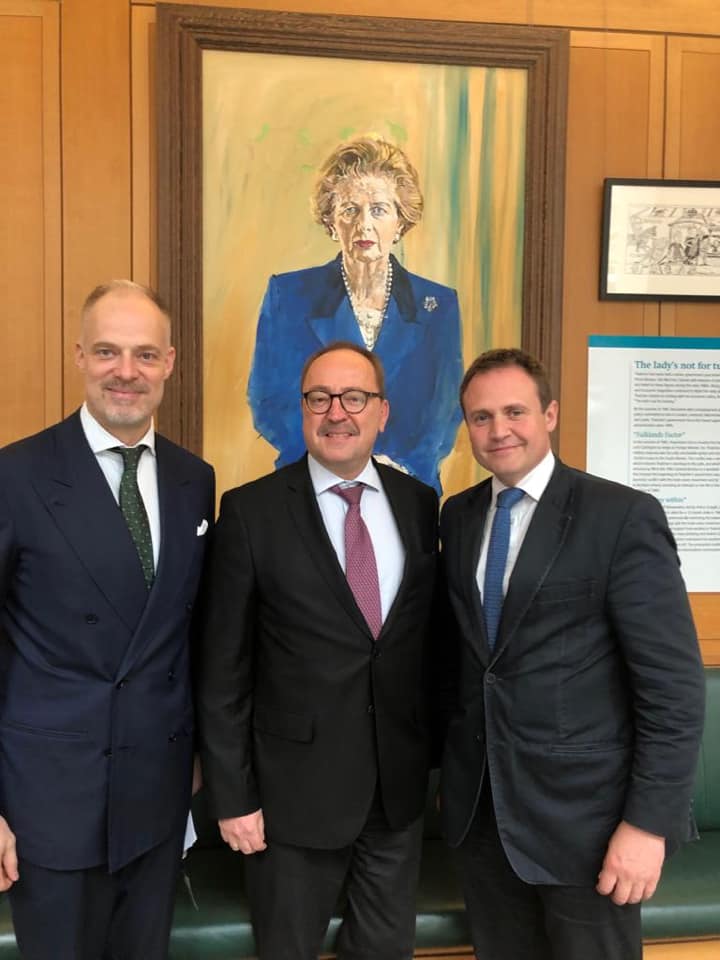 Mr Zsolt Németh, Chairman of the Foreign Affairs Committee of the Hungarian National Assembly, visited London to participate in a PACE Monitoring Committee meeting of the Council of Europe.
Mr Zsolt Németh, Chairman of the Foreign Affairs Committee of the Hungarian National Assembly, visited London to participate in a PACE Monitoring Committee meeting of the Council of Europe.
During his visit to London, Mr Németh held bilateral discussions with David Lidington MP, Minister for the Cabinet Office to exchange views about post-Brexit foreign and security policy cooperation and Tom Tugendhat MP Chairman of the Foreign Affairs Committee of the House of Commons to discuss bilateral relations, including cooperation opportunities between their committees and the future of conservative parties.
During the visit, Ambassador Kristóf Szalay-Bobrovnicky welcomed Mr Németh and other prominent actors of the British political life for a working dinner.
Delegation of the Hungarian Chamber of Agriculture in London
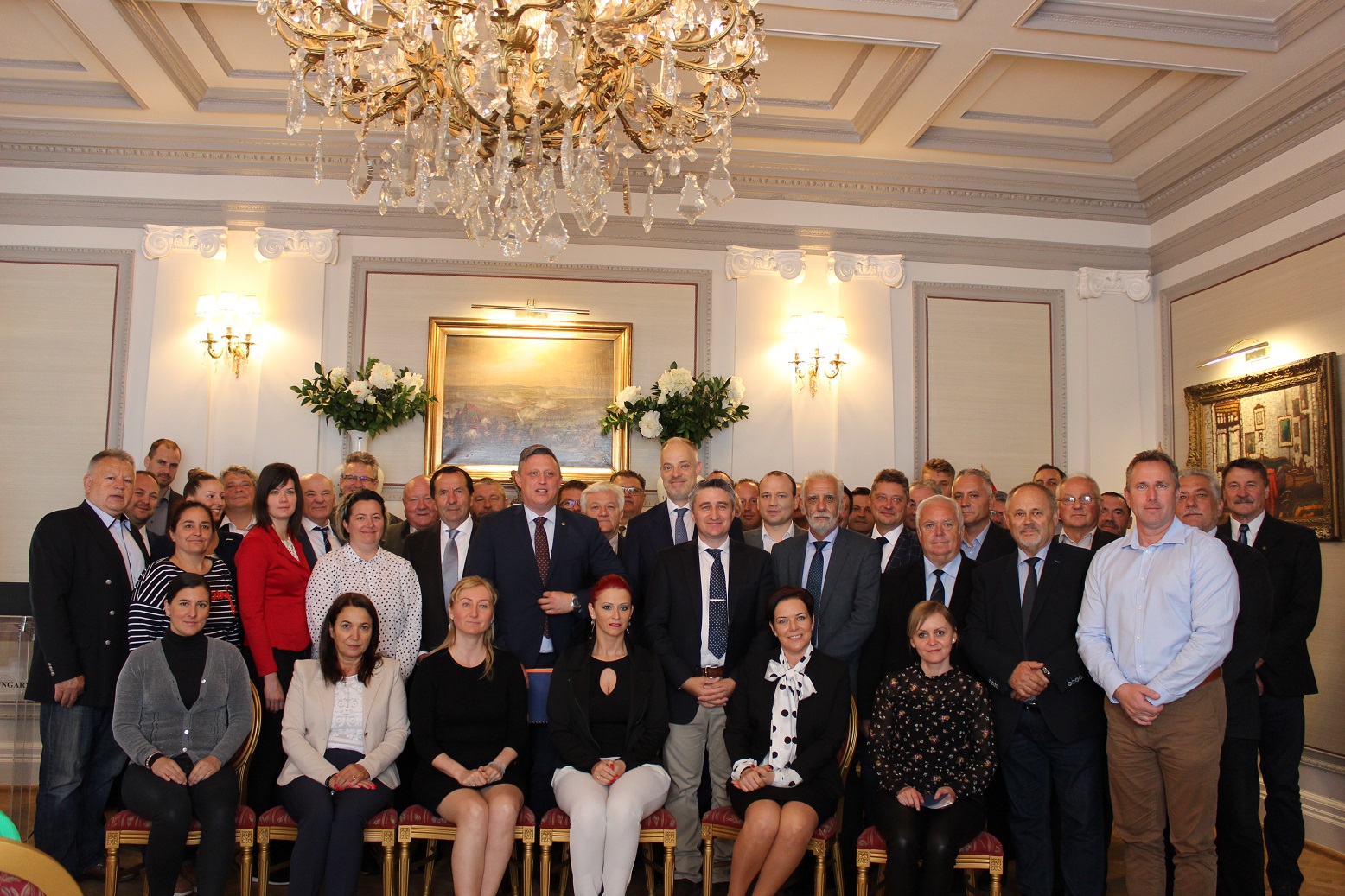 The Embassy of Hungary welcomed the delegation of the Hungarian Chamber of Agriculture (HCA).
The Embassy of Hungary welcomed the delegation of the Hungarian Chamber of Agriculture (HCA).
The guests were welcomed by Ambassador Kristóf Szalay-Bobrovnicky and Agricultural and Environmental attaché Enikő Magyar. During the visit the delegation met representatives of the Department for Environment, Food and Rural Affairs (DEFRA) and the National Farmers Union (NFU).
Ambassador Szalay-Bobrovniczky highlighted that the UK is Hungary’s 10th biggest trading partner in terms of agriculture. The bilateral trade in goods in the recent years has gone up (by 67% in the last seven years), and the agricultural export in 2018 was close to 240 million GBP. The Ambassador stressed that Hungary remains committed to working closely with the UK, and welcomes the interest in economic and professional collaboration from all parties. He confirmed that the Embassy – most of all the agricultural and environmental attaché – is ready to give all support to the representatives of the Hungarian and the British agriculture in order to further develop the cooperation between the two countries.
Philip Hambling, Head of Food and Farming at the NFU and John Powell, Deputy Team Leader of the Environmental Management Team at DEFRA spoke about the challenges of British agriculture, the development and directions of agricultural research, the new support schemes for agriculture and the possibilities for cooperation after Brexit.
Zoltán Kovács in London
The Secretary of State for International Communication and Relations Zoltán Kovács arrived in London to inform representatives of British public life and the British press about current Hungarian political and economic developments.
He met with representatives of the press to brief them about Hungary’s EP election results, its current political and economic affairs, and also reflected on the UK’s internal political discussion on Brexit. He stressed that in relations to the future agenda of the European Council the Hungarian government wishes to enforce the standpoint according to which migration must be stopped, not managed. He also highlighted that Hungary’s firmly represented position includes maintaining respect for member state sovereignty and doing away with the application of double standards. He emphasised again that Hungary supports neither Manfred Weber nor Frans Timmermans for the European Commission presidency, and claimed that the opinion of the Visegrad countries will be unavoidable during the decision-making process.
Mr Kovács also met senior journalists of the Financial Times who stated their questions regarding the top EU jobs, the multiannual financial framework negotiations and illegal migration, and gave an interview to the Channel 4 News channel about Hungary’s stance on migration and the Brexit talks.
Mr Kovács also participated in the Matthias Corvinus College London Summit event.
Minister of State Judit Varga in London
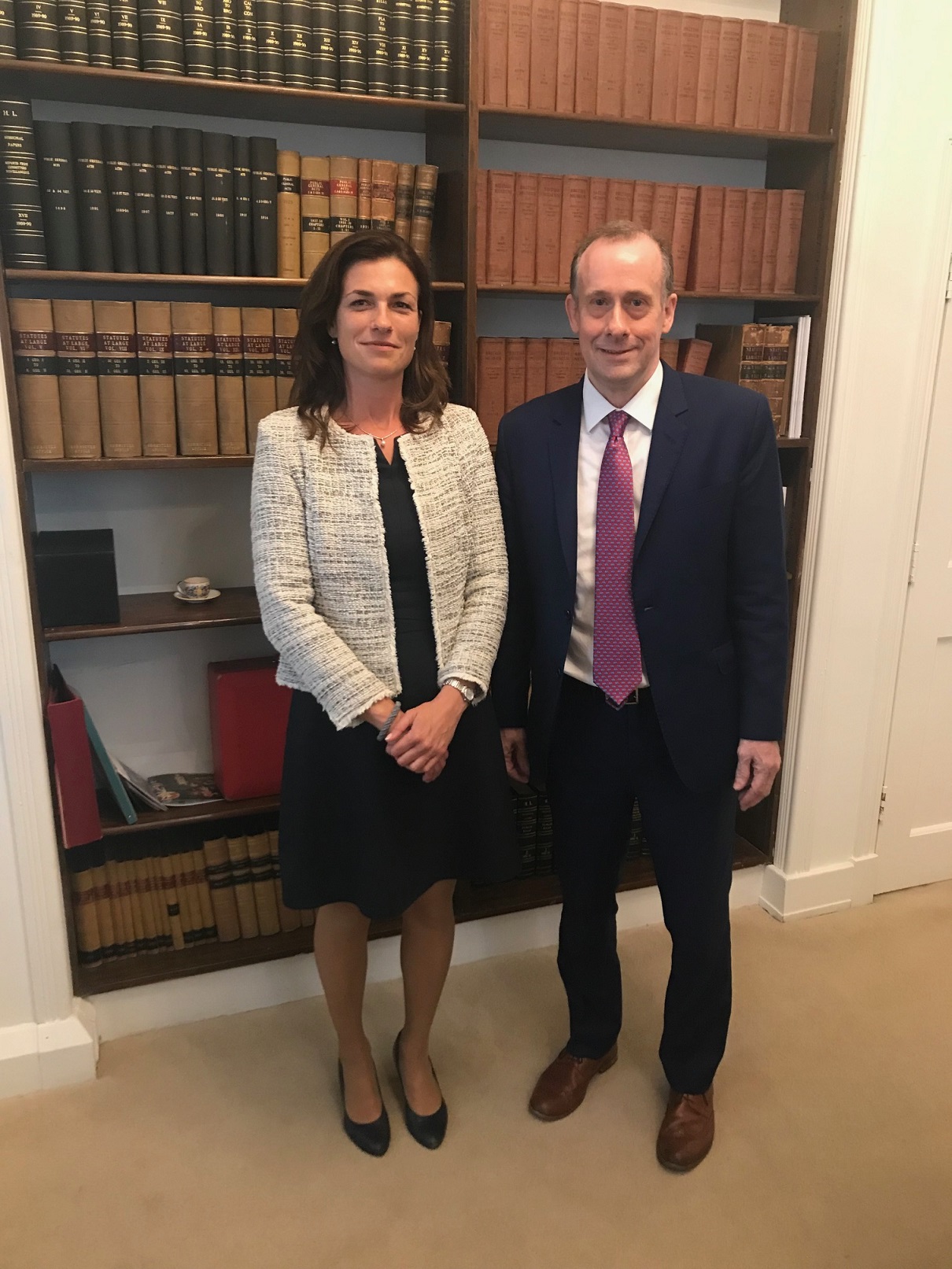 Ms Judit Varga, Minister of State for EU Relations arrived in London for a visit.
Ms Judit Varga, Minister of State for EU Relations arrived in London for a visit.
During her visit Ms Varga met Minister of State Martin Callanan (Department for Exiting the European Union) for an exchange of views on the current EU and UK political situation. She also discussed the political state of play on Brexit, in particular the issue of the Northern Irish backstop with Mr Greg Hands, Conservative MP for Chelsea and Fulham. Ms Varga also participated at the Matthias Corvinus College London Summit event.
Budapest Forum for Christian Communicators
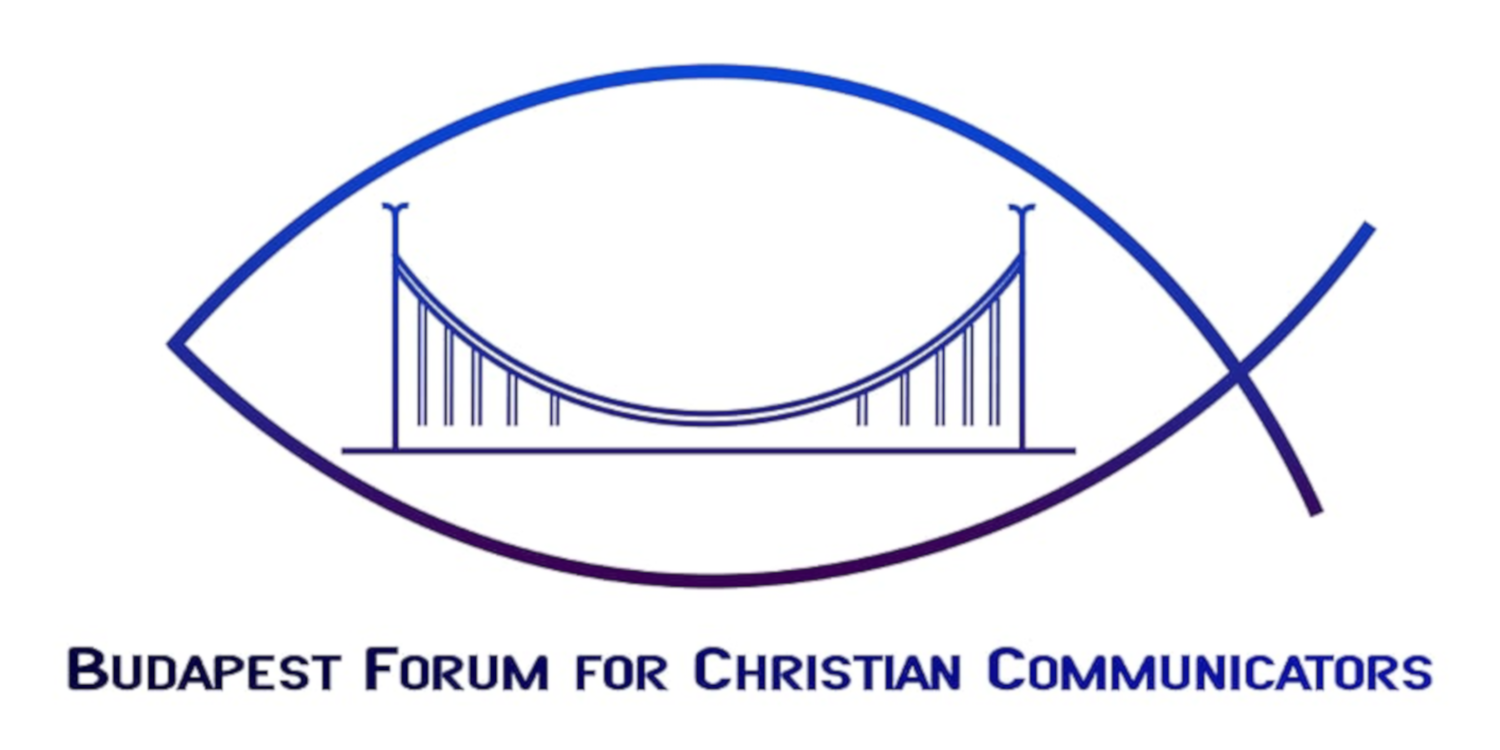
In several respects, Europe finds itself at a crossroads. Fundamental decisions have to be made which will determine the fate of the continent. Some of the major challenges Europe is facing today have a bearing on the Christian identity of the continent. This thousand-year old identity could provide inspiration for finding the appropriate answers to these challenges. This puts a particular responsibility on the shoulders of Christian-affiliated media and more generally of journalists who are guided by the teachings of the Church in their everyday work. Bringing together eminent persons dealing with contemporary issues of Christian civilization and the Christian segment of the press for an intensive exchange of views would give an impetus to the reflection process already going on in Europe and form the current political discourse.
With the above considerations in mind, the Ministry of Foreign Affairs and Trade of Hungary decided to provide a platform for an international conference. The three-day public event will take place on 4-6 September 2019 in Budapest. The conference will be structured around broad topics like “Christian journalism”, “Christianity in the 21st century”, “Persecution of Christians” and “Christianity and family”. Under each broad topic different panels would examine specific aspects of the issue at hand in more detail. As keynote speakers and panelists, distinguished and internationally respected personalities with various backgrounds (e.g. religious leaders, scholars, politicians, journalists) and views will be invited from all over the world, in order to encourage interesting, thorough and fruitful discussions, looking at different perspectives and giving food for future thought. Every keynote address and panel discussion will be followed by a Q&A session with the speakers in order to offer ample opportunity for an interactive exchange of views.
Some of the questions that will be up for debate: What does Christianity mean in the 21st century? How should developments in Europe and other parts of the world be interpreted? What are the biggest dilemmas of our times? How can our respective families and nations best be served? What is Christian journalism? What constitute Christian values? Which Christian values are under biggest threat?
Szabolcs Takács Ministerial Commissioner in London
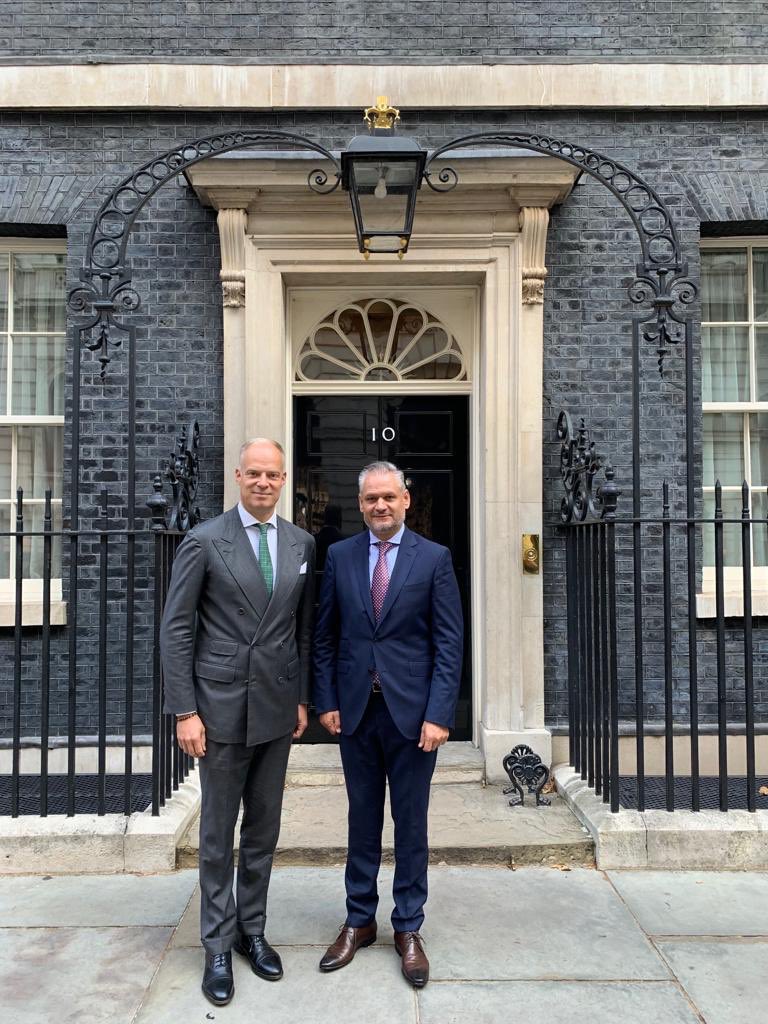 Szabolcs Takács, Ministerial Commissioner for Brexit visited London between 18-20 September 2019 to hold meetings on the Brexit process, the future relationship between the UK and Hungary, and the rights of Hungarian citizens during Brexit. He met with Lord Callanan, Minister of State at the Department for Exiting the European Union and experts of the Ministry; Christopher Pincher, Minister of State at the Foreign and Commonwealth Office; Sir Tom Scholar, Permanent Secretary to the Treasury; and other MPs, researchers and experts.
Szabolcs Takács, Ministerial Commissioner for Brexit visited London between 18-20 September 2019 to hold meetings on the Brexit process, the future relationship between the UK and Hungary, and the rights of Hungarian citizens during Brexit. He met with Lord Callanan, Minister of State at the Department for Exiting the European Union and experts of the Ministry; Christopher Pincher, Minister of State at the Foreign and Commonwealth Office; Sir Tom Scholar, Permanent Secretary to the Treasury; and other MPs, researchers and experts.
Press speculations about Hungarian veto on Brexit extension
In the last days there have been talks in the British press that Prime Minister Boris Johnson had asked certain EU countries, including Hungary, to veto any extension to the Brexit deadline. Referring to the speculation Minister Szijjártó stated “We have read the rumors about this but the Hungarian government has not been approached with such a request.”
Read more about Minister Szijjártó's statement on Brexit: http://abouthungary.hu/news-in-brief/fm-rights-of-hungarians-living-in-the-uk-must-be-upheld/
Minister Péter Szijjártó in London

Minister of Foreign Affairs and Trade Péter Szijjártó arrived in London for an official visit on 3 October 2019. He met his counterpart, Foreign Secretary Dominic Raab and highlighted shared priorities and possible venues for cooperation including the mutual priority of helping persecuted Christians worldwide. They emphasized that relations between Hungary and the UK should be unharmed by Brexit. During the meeting with Minister Szijjártó, Chancellor of the Duchy of Lancaster Michael Gove shared details of UK’s preparation for all Brexit scenarios. Continuing his visit Minister Szijjártó discussed with Secretary of State Steve Barclay details of the current state of the Brexit negotiations with special attention to the rights of Hungarian citizens in the UK and UK citizens in Hungary.
The Minister also gave a speech at a business forum at the Embassy to talk about investment opportunities and prospects in Hungary with representatives of the British business community. Moreover, he also met several business leaders investing in Hungary discussing their experiences. Father János Csicsó of the Association of Roman Catholic Hungarians in Great Britain briefed the Minister about his parish and the Hungarian community living in UK. Minister Szijjártó also gave an interview to BBC2 Newsnight’s Kirsty Wark covering Brexit negotiations and Hungarian foreign policy priorities.
II. National Educational Conference for Hungarian Schools in the UK
 The second National Educational Conference for Hungarian Schools in the UK was held on the weekend of 12-13 October 2019 for teachers and educational professionals of Hungarian schools operating in the UK.
The second National Educational Conference for Hungarian Schools in the UK was held on the weekend of 12-13 October 2019 for teachers and educational professionals of Hungarian schools operating in the UK.
In cooperation with the National Federation of Hungarians and the Hungarian Cultural Centre, the two-day programme focused on cooperation, educational materials and the impact of Brexit. Altogether 70 professionals from 19 schools participated in the event, sharing their expertise and best practices. The good work of the professionals is proved by the high number of students in their courses each year.
Louis XIV, Ferenc Rákóczi and the Fate of Hungary
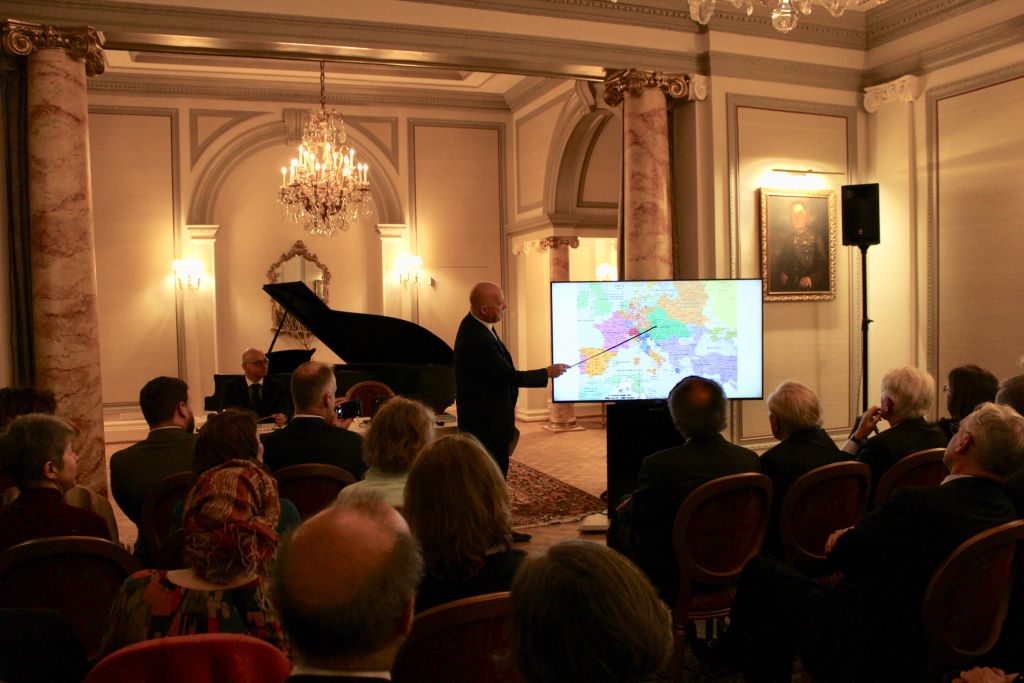 Author and historian Philip Mansel joined Prof Dr Ferenc Tóth, senior fellow of the Hungarian Academy of Sciences for a talk on Louis XIV, Ferenc Rákóczi at the Embassy on 30th January 2020. The two experts discussed the relationship between the two historical figures, touching upon the wars of the Spanish Succession, Rákóczi’s War of Independence and his exile. Mr Mansel also presented his new biography, King of the World: The Life of Louis XIV.
Author and historian Philip Mansel joined Prof Dr Ferenc Tóth, senior fellow of the Hungarian Academy of Sciences for a talk on Louis XIV, Ferenc Rákóczi at the Embassy on 30th January 2020. The two experts discussed the relationship between the two historical figures, touching upon the wars of the Spanish Succession, Rákóczi’s War of Independence and his exile. Mr Mansel also presented his new biography, King of the World: The Life of Louis XIV.
Government support for Hungarian R&D&I activities during the COVID-19 crisis.
|
NRDI Office introduces flexible disbursement rules for advances, simpler administration and a new RDI Hotline channel to support all stakeholders of the domestic innovation ecosystem |
|
Due to the current coronavirus pandemic, applicants, evaluators and financing institutions of pub-licly funded R&D and innovation projects are all facing new challenges. The NRDI Office comes up with eased rules for disbursement of advances to alleviate cash-flow difficulties of ongoing pro-jects and supports beneficiaries of funded proposals with simpler administrative procedures and prolonged submission deadlines. https://nkfih.gov.hu/english/press-releases/the-nrdi-office-introduces |
Bővebb információk az emberkereskedelemről
Az emberkereskedelem: „Személyek kizsákmányolás céljából való toborzása, szállítása, átadása, rejtegetése vagy fogadása – az adott személyek feletti ellenőrzés megváltoztatását vagy átadását is ideértve – fenyegetéssel, erőszakkal vagy egyéb kényszer alkalmazásával, emberrablással, csalással, megtévesztéssel, hatalommal vagy a kiszolgáltatott helyzettel való visszaélés révén, illetve anyagi ellenszolgáltatásnak vagy előnyöknek valamely személy felett ellenőrzést gyakorló személy beleegyezésének megszerzése érdekében történő nyújtásával vagy elfogadásával. A kizsákmányolás magában foglalja legalább a prostitúció révén történő kizsákmányolást vagy a szexuális kizsákmányolás más formáit, a kényszermunkát vagy - szolgáltatásokat – a koldulást, a rabszolgatartást vagy a rabszolgatartáshoz hasonló gyakorlatot és a szolgaságot is ideértve –, a bűncselekményhez kapcsolódó kizsákmányolást és a szervek kivételét."
Az Európai Parlament és a Tanács 2011/36/EU irányelve
Az emberkereskedelem célja:
· Prostitúció révén történő kizsákmányolás vagy a szexuális kizsákmányolás más formái
· Kényszermunka vagy más szolgáltatások, beleértve a koldulást
· Rabszolgatartást vagy a rabszolgatartáshoz hasonló gyakorlat
· Szolgaság
· A bűncselekményekhez kapcsolódó kizsákmányolás
· Szervek kivétele
Ha a felsorolt tevékenységek, eszközök vagy célok valamelyikét észleljük, vélhetően emberkereskedelem áldozatáról van szó.
Ha az érintett személy gyermek, nem kell figyelembe venni, hogy bármely felsorolt eszközt alkalmazzák-e. A tevékenység bármilyen típusú kizsákmányolás céljából történő végzése elegendő az emberkereskedelem gyanújához.
Legislation in the UK to combat modern slavery
- the Modern Slavery Act 2015 for England and Wales, which received Royal Assent on 26 March 2015
- the Human Trafficking and Exploitation (Scotland) Act 2015 for Scotland, which received Royal Assent on 4 November 2015
- the Human Trafficking and Exploitation (Criminal Justice and Support for Victims) Act (Northern Ireland) 2015 for Northern Ireland, which received Royal Assent on 13 January 2015
Modern slavery crimes are not new to the UK, and they were punishable against previous offences prior to the introduction of the new Acts in 2015. The new legislation increased the maximum penalties for offences to life imprisonment and introduced further protection and support for victims.
National referral mechanism:
NGO websites:
https://www.citizensadvice.org.uk/immigration/trafficking/report-human-trafficking/
https://www.citizensadvice.org.uk/about-us/contact-us/contact-us/contact-us/
https://www.modernslaveryhelpline.org/about/spot-the-signs
https://www.salvationarmy.org.uk/modern-slavery
NSPCC’s helpline on 0808 8005 000 if you think a child is in danger of trafficking
Magyar joganyag: 354/2012. (XII. 13.) Korm. rendelet az emberkereskedelem áldozatai azonosításának rendjéről
2. Az emberkereskedelem áldozataként külföldön azonosított magyar állampolgárokkal kapcsolatos eljárásra vonatkozó különös szabályok
6. § (1) Külföldön magyar állampolgár emberkereskedelem áldozataként történő azonosítására irányuló eljárásban a konzuli tisztviselő, valamint az emberkereskedelem áldozatainak azonosítására irányuló eljárásban önkéntesen közreműködő szervezet a 2. §-ban meghatározottakon túl tájékoztatja az emberkereskedelem áldozataként azonosított személyt a védett szálláshelyen történő elhelyezés feltételeiről.
(2) Az OKIT (Országos Kríziskezelő és Információs Telefonszolgálat) az emberkereskedelem áldozataként külföldön azonosított magyar állampolgár szálláshely igényével kapcsolatos értesítést a konzuli tisztviselőtől, a rendőrségtől, valamint az emberkereskedelem áldozatainak azonosítására irányuló eljárásban önkéntesen közreműködő szervezettől fogad el.
(3) Az OKIT az értesítést követően tájékoztatja a (2) bekezdésben meghatározott szerven keresztül az emberkereskedelem áldozataként azonosított személyt a védett szálláshely hozzáférhetőségéről. Amennyiben az emberkereskedelem áldozataként azonosított személy a védett szálláshelyen történő elhelyezését kéri, őt az OKIT a (2) bekezdésben meghatározott szervezet közreműködésével a védett szálláshelyre irányítja.
AZ EMBERKERESKEDELEM ÁLDOZATAI SZÁMÁRA NYÚJTHATÓ VÉDETT SZÁLLÁSHELY / SPECIÁLIS SEGÍTSÉG
Kiemelt csoportként részesülhetnek támogatásban azok, akiket emberkereskedelem áldozataként azonosítottak. Ezen áldozati kör egy részével (harmadik országbeliek) összefüggésben az Áldozatsegítő Szolgálat többlettájékoztatási feladatokkal is rendelkezik. A Szolgálat ilyen esetekben tájékoztatást nyújt arról, hogy egy hónap gondolkodási idő áll az áldozat rendelkezésére annak eldöntésére, hogy a bűncselekmény felderítésében a hatóságokkal együttműködik-e, valamint arról, hogy a gondolkodási idő tartamára ideiglenes tartózkodásra jogosító igazolásra, a hatóságokkal való együttműködés időtartamára pedig tartózkodási engedélyre jogosult. Amennyiben az emberkereskedelem áldozata magyar állampolgárságú (illetve azzal egy tekintet alá eső), számára védett szálláshely biztosítható.
A védett szálláshely biztosításával kapcsolatos szolgáltatás nem függ a büntetőeljárás megindulásától, kizárólag emberkereskedelem áldozataként azonosított áldozatok számára vehető igénybe.
E szolgáltatást nem az Áldozatsegítő Szolgálat biztosítja, hanem az állammal külön jogszabály alapján szerződő szálláshelyek.
A védett szálláshely igénybevételével összefüggésben az Országos Kríziskezelő és Információs Telefonszolgálat (OKIT) a
06/80-20-55-20
számon nyújthat bővebb tájékoztatást. Az Országos Kríziskezelő és Információs Telefonszolgálat szolgáltatásának elsőrendű célja, hogy segítséget nyújtson a kapcsolati erőszak, a gyermekbántalmazás, a prostitúció- és emberkereskedelem áldozatainak és szükség esetén gondoskodjon az elhelyezésükről.
Országos Kríziskezelő és Információs Telefonszolgálat honlapja
Együtt az emberkereskedelem ellen
http://aldozatsegitokozpont.im.gov.hu/drupal/

